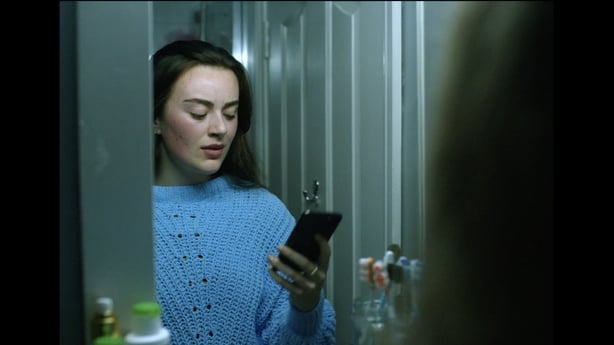On Safer Internet Day, Today with Claire Byrne reporter Brian O'Connell found out just how difficult it is to have a significant online presence when you’re a woman and not receive – at best – unwanted attention from men you don’t know.
Image-based abuse and online harassment are alarmingly frequent and Irish law has been updated recently in an attempt to combat this. Brian spoke to two women who regularly receive unsolicited contact from men.
Read more: What is 'revenge porn' and is it illegal in Ireland?

Brian told Claire that it really struck him while doing his research how common it is for women to receive unsolicited messages and images or abusive engagements mostly from men:
"Many of the women told me it was a daily experience, particularly around men sending them unsolicited explicit pictures."
Model and former Miss Ireland Holly Carpenter is very active on social media and has a large following on Instagram. She told Brian that she regularly receives unsolicited "interactions" from men online:
"It all started back in probably 2011 when Snapchat was really big. I was getting bombarded with these really explicit photographs. I’m sure you can imagine what I’m talking about. I remember telling some of my male friends that it was happening and they thought it was hilarious."
Read more: Online dating: Is oversharing or human psychology doing us harm?
Of course, men thinking that a stranger sending explicit pictures to a woman is funny might go some way towards explaining why this sort of online harassment has gone on for so long with so little done to crack down on it.
It wasn’t funny at all, Holly said, it was really disturbing and it led to her more or less abandoning the Snapchat platform, even though she was using it for her work at the time. Holly doesn’t get so much explicit content on her Instagram account, but she does get bizarre requests from strangers:
"Guys asking me for pictures of my feet, asking me for my underwear, asking me to send them nude photos. And these are people who, obviously, I’ve never met, I don’t know who they are... I’m just like, 'What goes through their head?’"
Brian wonders why there isn't some kind of a filter on social media that could censor explicit photos to your account from people you don't know. And Holly told him that such a filter is badly needed, as her grandmother might have seen an unsolicited photo sent to her:
"I remember I got one when I was sitting beside my granny before and I was like, mortified thinking she might have seen it."
Read more: Free resources to help parents talk to teens about online safety
Linda Hayden works as an advocate for the Victims Alliance and is also an active social media user. Linda told Brian that she leaves her Direct Messages open on Twitter so people can contact her for work-related reasons, but this means that some men will send her unsolicited content:
"Sometimes it’s images which are inappropriate. It is a form of image-based sexual abuse, you know, sending unsolicited d**k pics and stuff like that."
When Brian wonders where the impulse comes from to do such a thing, Linda tells him that it’s called "cyberflashing" and is quite a common phenomenon, particularly among women.
Linda’s advice to anyone who encounters this sort of harassment? "If you get something that you don’t want to see – report it."
You can her Brian’s full report on online harassment and abuse, as well as Cyberpsychology Researcher and Lecturer Nicola Fox Hamilton’s conversation with Claire about it, by going here.


